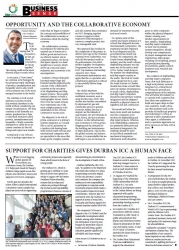Prasheen Maharaj - Opportunity And The Collaborative Economy2018-07-11 Prasheen Maharaj, CEO, Southern African Shipyards
There is an African saying that “if you want to go fast, go alone. If you want to go far, go together.†This saying could not be more relevant today in South Africa. As we enter a “New Dawn†we continue to be besieged by the perpetual triple challenges of poverty, unemployment and inequality and to add, South Africa remains one of the most unequal societies in the world. We continue to look at and replicate economic models that worked elsewhere in the world without considering our unique circumstances. We thus continue to fail dismally as a nation, perplexed as to how to slay these monsters called poverty, unemployment and inequality. Clearly economic disruption is called for as we cannot continue do the old things and expect new results. Going back to our African roots, is perhaps opportune in order that we begin to explore the concept and possibilities of the collaborative economy or sometimes called the sharing economy. The collaborative economy encompasses the sharing and optimal use of resources to deliver goods and service in an efficient manner and at competitive prices. We know that spare capacity is a dead weight loss to society, which drives up costs and causes industries and economies to be uncompetitive. Southern African Shipyards has made major leaps and bounds towards employing the concept of the collaborative economy in the execution of its Shipbuilding and Ship Repair Projects. The recently awarded contract to build a Hydrographic Survey Vessel (HSV) for the South African Navy represents one of the most complex projects to be undertaken in the African continent in recent years. The shipyard, in its role of prime contractor or a primary systems integrator, as I would like to call it, partnered on a turnkey risk sharing basis with several South African and international companies who are specialists in the areas that make up the complex systems and sub-systems that constitutes an HSV. Bringing together a team of experts in their respective fields managed to convert a complex project into very manageable task. This approach has resulted in the completion of the project to deliver nine tugs to the Transnet National Ports Authorities. Not only did this project result in the achievement of an R800 million Supplier Development Programme but we won the KZN Top Business Partnership Award in 2017. These achievements demonstrate once again that the co-operative and collaborative approach is critical to successfully deliver large projects. The Global Maritime Industry has, in line with the worldwide recession, seen a steep decline since 2008. This decline was further exacerbated by depressed oil, gas and commodity prices in general. However, within this sea of despair, we find islands of opportunity. We are fortunate to be in Africa, the last economic frontier. As the infrastructure and economies of Africa grows, shipping and the demand for the building and maintenance of ships shall grow. Add to this the global security and defence threats, it is unavoidable that we will begin to see an increase in demand for maritime security and naval vessels. To capture some of this current and future demand, it is critical that shipyards become internationally competitive. The traditional models employed by local shipyards and the government has clearly not worked. By comparison, the South Korean shipbuilding industry and the South African shipbuilding industry was the same size in the early to mid-1970s. Today, South Korea is the number one shipbuilding and ship repair country in the world. The trick for South Africa should not be to copy the South Korean or Chinese models but create a model that suits our unique circumstances. In South Africa, shipbuilding and ship repair companies should become primary systems integrators and the shipyard should be a physical cluster of suppliers and sub-contractors. This model will allow for many more small and medium size BEE companies to be involved in shipbuilding and ship repair projects. Whereas now, shipbuilding companies are primarily fabricators and mechanical integrators, the emphasis should be more on steel block assembly and mechanical integration. Fabrication work should be given to other companies within the physical shipyard cluster, creating even further opportunities for BEE SMMEs. Shipbuilding and ship repair companies, in their role of primary systems integrators, should develop core competencies in project management and engineering, ships design including 3D modelling, project and production planning, procurement, quality control, assurance and, research and development. The evolution of shipbuilding and ship repair companies from a low-tech fabricator to a high-tech primary systems integrator is a critical factor in driving the growth and competitiveness of the industry. This will allow the industry to co-operate with countries that have their own ambitions to build and repair ships in their own countries. South Africa can then position itself as the provider of intellectual property and technology to Africa as opposed to just a manufacturer. Once again, a collaborative and co-operative approach can drive success at an intra-Africa level. Tel: +27(0) 31 274 1800 PrasheenM@sa-shipyards.co.za www.sa-shipyards.co.za |
Prasheen Maharaj - Opportunity And The Collaborative Economy
Copyright © 2025 KwaZulu-Natal Top Business
